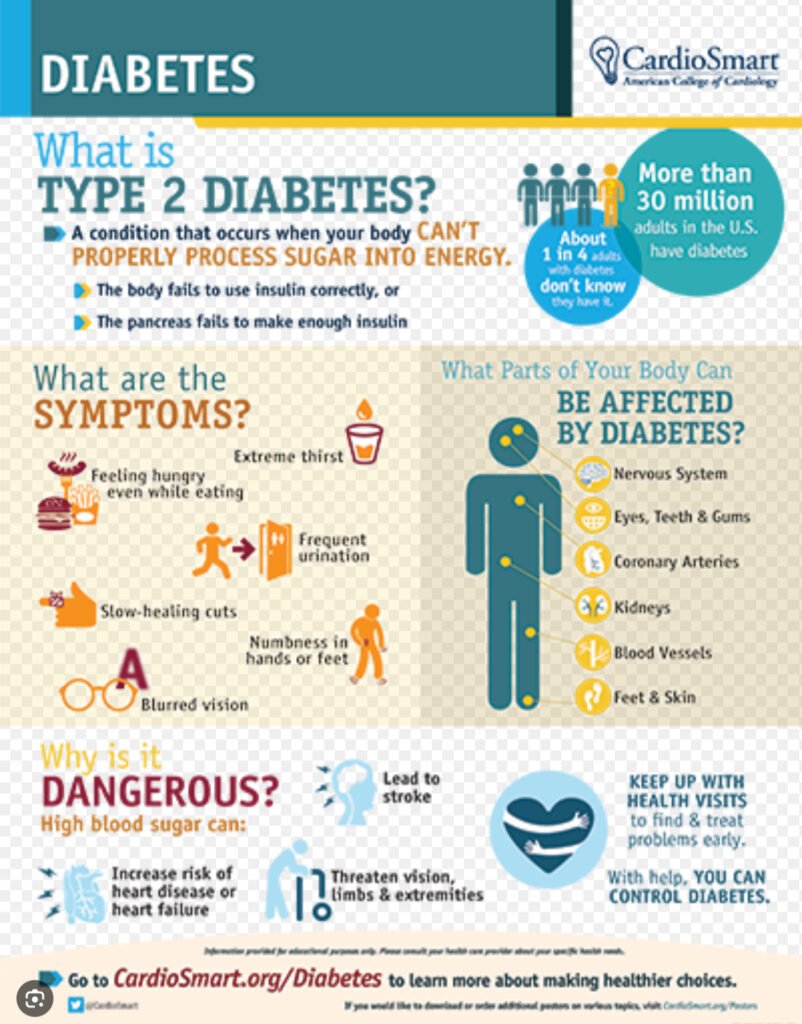Understanding Type 2 Diabetes

Type 2 diabetes is a chronic condition characterized by elevated blood glucose levels resulting from the body’s ineffectiveness in using insulin effectively, a phenomenon known as insulin resistance. Unlike type 1 diabetes, where the body fails to produce insulin, type 2 diabetes predominantly arises when the pancreas does not produce enough insulin to manage glucose levels, or the body cells become less responsive to insulin’s effects.
The causes of type 2 diabetes are multifaceted, encompassing genetic, environmental, and lifestyle factors. Obesity stands out as a significant risk factor, as excess fat can trigger insulin resistance. Furthermore, sedentary behavior and a diet high in refined carbohydrates and sugars contribute significantly to the development of this condition. Age also plays a critical role, as the likelihood of developing type 2 diabetes increases with advancing age, and it is more prevalent among individuals with a family history of diabetes.
When unmanaged, type 2 diabetes can lead to severe complications, affecting various body systems, particularly the cardiovascular system, kidneys, eyes, and nerves. Prolonged high blood sugar levels can cause damage to blood vessels and nerves, leading to issues such as diabetic neuropathy, retinopathy, and an increased risk of cardiovascular diseases. Recognizing these risks emphasizes the importance of early detection and lifestyle modifications tailored to managing this illness effectively.
Adopting a proactive approach to learning about type 2 diabetes and its implications enables individuals to make informed decisions regarding their health. By understanding insulin resistance and how personal habits influence glucose levels, one can take meaningful steps toward preventing or managing type 2 diabetes. This foundational knowledge is crucial for implementing effective strategies that promote better health outcomes and enhance quality of life.
Adopting a Balanced Diet
Managing type 2 diabetes through dietary strategies is essential for achieving better health outcomes. A balanced diet plays a vital role in controlling blood sugar levels and ensuring overall well-being. Central to this approach is the incorporation of whole grains, lean proteins, healthy fats, and a rich variety of fruits and vegetables.
Whole grains, such as brown rice, quinoa, and whole grain bread, are key components as they are high in fiber and have a lower glycemic index. These grains help in regulating blood sugar levels by allowing for a slower release of glucose into the bloodstream. On the other hand, lean proteins, such as chicken, fish, beans, and legumes, are crucial for muscle maintenance and support metabolism without significantly impacting blood sugar levels.
In addition to whole grains and proteins, the inclusion of healthy fats, such as those found in avocados, nuts, and olive oil, can be beneficial. These fats not only contribute to heart health but also help in maintaining satiety, which aids in portion control. It is equally important to fill one’s plate with a variety of colorful fruits and vegetables, as they provide essential vitamins, minerals, and antioxidants while being low in calories and carbohydrates.
Meal planning is an effective strategy for anyone managing type 2 diabetes. By pre-planning meals, individuals can ensure balanced nutrition and avoid impulsive food choices that may compromise their dietary goals. Portion control is another critical aspect, where being mindful of serving sizes can prevent overeating and help maintain stable blood sugar levels. Furthermore, monitoring carbohydrate intake through carbohydrate counting enables better management of blood sugar fluctuations. Transitioning to this mindful eating approach can significantly benefit those diagnosed with type 2 diabetes, leading to improved health and quality of life.
Incorporating Regular Physical Activity
Physical activity plays a crucial role in managing type 2 diabetes, contributing significantly to better blood sugar control and overall health. Engaging in regular exercise helps improve insulin sensitivity, allowing the body to utilize glucose more effectively and reducing blood sugar levels. Additionally, physical activity can assist in weight management, which is particularly important as excess weight is closely linked to the progression of type 2 diabetes. Furthermore, consistent exercise has been shown to enhance cardiovascular health, boost mental well-being, and improve energy levels.
Various forms of exercise can be seamlessly integrated into daily routines, catering to different fitness levels and preferences. Low-impact activities such as walking, swimming, or cycling are particularly effective for those who may be new to exercise or have mobility concerns. These options allow for gradual progression, making it easier to establish a regular routine. For individuals seeking a more vigorous workout, strength training and aerobic exercises can be beneficial. Activities like jogging, dancing, or group fitness classes can elevate heart rate and further enhance fitness levels while promoting social interaction.
Despite the evident benefits, potential barriers to exercise must be acknowledged. Time constraints, financial limitations, and lack of motivation can hinder an individual’s ability to maintain an active lifestyle. To overcome these challenges, one can set realistic goals, choose enjoyable activities, and schedule workouts into their daily routines. Additionally, finding a workout buddy or joining a community group can provide the necessary support and encouragement to stay consistent. By addressing these concerns and incorporating physical activity into everyday life, individuals can significantly enhance their ability to manage type 2 diabetes effectively.
Monitoring and Managing Your Diabetes
Effective management of Type 2 diabetes requires a comprehensive approach to monitoring blood sugar levels regularly. Keeping track of these levels is essential for making informed decisions regarding diet and physical activity. Blood glucose monitoring empowers individuals to understand how different foods and exercises impact their blood sugar. For instance, noticing a spike in glucose levels after a particular meal may guide a person to make healthier dietary choices in the future. Frequent self-monitoring also aids in recognizing patterns and trends, enabling proactive measures to maintain blood sugar within the target range.
Incorporating regular consultations with healthcare professionals is crucial for personalized diabetes management. These experts can help develop tailored management plans that include dietary recommendations, exercise regimens, and medication adherence. The guidance of healthcare providers can facilitate timely adjustments in treatment, addressing any complications that may arise. Health professionals often collaborate with patients to set realistic goals, providing motivation and accountability. Moreover, understanding the importance of adherence to prescribed medication is fundamental in preventing complications associated with diabetes.
Living with Type 2 diabetes can present emotional challenges that may affect overall well-being. Individuals may experience feelings of frustration, anxiety, or depression, making support networks vital for effective management. Engaging with family, friends, and support groups can help foster resilience and provide a platform for sharing experiences and coping strategies. These social interactions can alleviate the isolation often felt by those managing chronic conditions. Overall, successful diabetes management is not merely a physical endeavor; it encompasses emotional and psychological support, encouraging individuals to lead fulfilling lives while effectively managing their diabetes.








